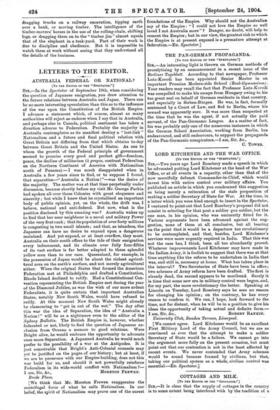AUSTRALIA FEDERAL OR NATIONAL ?
[TO THE EDITOR OF THE "SPECTATOR"]
the Spectator of September 10th, when considering the question of Japanese emigration, you drew attention to the future relations between Australia and Japan. There can be no more interesting speculation than this as to the influence of the war upon the Constitution of the British Empire. I advance a statement which, of course, almost as many authorities will reject as endorse when I say that in Australia, and perhaps also in Canada, political sentiment has taken a direction adverse to Federation. Probably the majority in Australia contemplates as its manifest destiny a " last-link " Nationalism and a future and final political relation with Great Britain not differing from that which obtains to-day between Great Britain and the United States. As one to whom the growth of the Federal principle of government seemed to promise every good and perfect gift—freedom, peace, the decline of militarism (a propos, contrast Federalism on the Northern Continent of America with Nationalism south of Panama) —I was much disappointed when in Australia a few years since to find, or to suppose I found, that separation—" Australia a Nation !"—was the desire of the majority. The matter was at that time perpetually under discussion, because shortly before my visit Mr. George Parkin had spoken all over those Colonies with great eloquence and sincerity ; but while I knew that he crystallised an important body of public opinion, yet, on the whole, the drift was, I believe, national and anti-federal. But now, what is the position disclosed by this amazing war? Australia wakes up to find that her near neighbour is a naval and military Power of the very first rank; that its population of over forty millions is congesting in two small islands ; and that, as islanders, the Japanese can have no desire to expand upon a dangerous mainland. And yet expand, or at least overflow, they must. Australia on their south offers to the tide of their emigration every inducement, and its climate over fully four-fifths of its vast surface is far better adapted to these splendid ' yellow men than to our race. Queensland, for example, in the possession of Japan would be about the richest agricul- tural area on the earth's surface, and not merely agricultural either. When the original States that formed the American Federation met at Philadelphia and drafted a Constitution, Rhode Island declined to ratify. Had a Constitutional Con- vention representing the British Empire met during the year of the Diamond Jubilee, as was the wish of our more ardent Federalists, it is quite certain that important Australian States, notably New South Wales, would have refused to ratify. At this moment New South Wales might already be clamouring to "get in out of the wet." The day after this war the idea of Separation, the idea of "Australia a Nation !" will be as a nightmare even to the editor of the Sydney Bulletin. The British Empire is, however, whether federated or not, likely to find the question of Japanese ex- clusion from Oceana a menace to good relations. Were Bright alive, he would embrace the opportunity to advocate once more Separation. A Japanned Australia he would much prefer to the possibility of a war at the Antipodes. It is just conceivable that Bright's Anti-Colonial counsels may yet be justified on the pages of our history; but at least, if we are to persevere with our Empire-building, does not this war build for us, and should it not powerfully reinforce Federalism in its wide-world conflict with Nationalism ?— I am, Sir, &c., MORETON FREWEN. Brede Place. foundations of the Empire. Why should not the Australian say of the Empire : "I could not love• the Empire so well loved I not Australia more" ? Danger, no doubt, will help to cement the Empire; but in our view, the greatest risk to which the Empire is at present exposed is a premature attempt at federatiOn.—En. Spectator.]






































 Previous page
Previous page